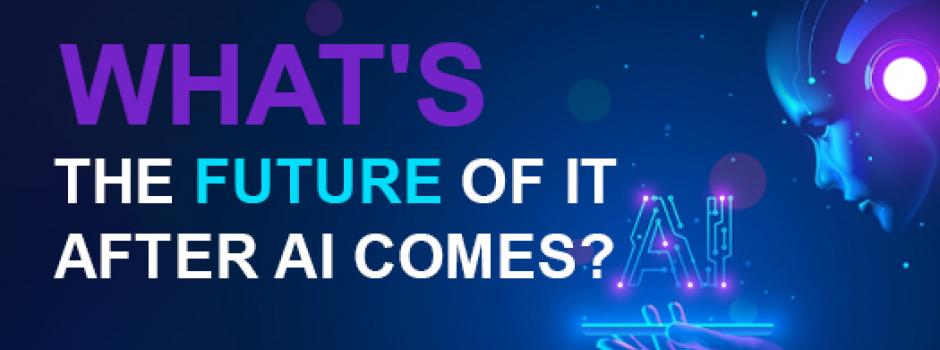Imagine a future where computers autonomously fix glitches, create tailored code, and proactively prevent cyber-attacks. Artificial Intelligence (AI), encompassing smart robots and learning machines, is already reshaping IT. It undertakes tasks, interprets vast data, customises user experiences, and ensures online safety.
Yet, this transformation is just scratching the surface. The potential includes innovations like self-driving cars and advancements in healthcare due to AI. This transition will redefine how people work in IT, fostering collaboration between humans and AI.
However, concerns arise, such as the impact of AI on jobs and ensuring fairness in AI systems. Comprehending the progression of IT infused with AI requires examining beyond technological advancements. Therefore, exploring the challenges and opportunities that accompany this evolution is vital.
In this blog below, we will explore the future of IT after AI, discuss the pros and cons, and find ways to be friendly with AI to survive in the rapidly evolving technological world!
Changes Introduced by AI In the IT Sector
Automation Revolution in IT -
- Data Analysis and Insights -
The integration of AI has profoundly altered IT operations. AI bots and algorithms now handle basic tasks such as data entry, network monitoring, and software testing, ensuring seamless operations. Additionally, AI extends its reach into predictive maintenance, preemptively addressing issues to maintain uninterrupted services.
- Personalised and Tailored Services -
AI-driven automation is reshaping traditional IT roles. As repetitive tasks diminish, IT professionals are freed to focus on strategic work. This transition demands the acquisition of new proficiencies, emphasising problem-solving and effective collaboration with AI systems.
- Security Enhancement and Threat Detection -
AI-driven tools play a pivotal role in elevating efficiency within IT. These tools analyse data, optimise workflows, and allocate resources more effectively, significantly boosting productivity. Moreover, predictive maintenance powered by AI algorithms ensures the prevention of system failures, fostering an environment of continuous operations and driving innovation in the IT sector.
Enhanced Capabilities and Operational Efficiency -
- Data Analysis for Informed Choices -
AI acts like a detective in the world of data, delving into massive amounts of information to uncover hidden patterns and trends. Doing so provides invaluable insights to decision-makers, guiding businesses in making smarter choices based on data-driven predictions and analysis.
- Customised IT Services for Tailored Experiences -
AI is a personalised assistant that adjusts IT services according to individual preferences and needs. It's like having a digital hand that tailors recommendations and services to create smoother, more efficient, and enjoyable user experiences.
- Robust Security Measures with AI Support -
AI-driven security systems work tirelessly, actively monitoring IT infrastructure for potential cyber threats. These systems promptly detect and respond to dangers in real time, fortifying the security posture of IT setups by swiftly addressing vulnerabilities and ensuring a solid defence against evolving risks.
Challenges of AI in the IT Sector
Job Displacement and Societal Impact -
As AI takes over some IT tasks, roles involving repetitive, rule-based responsibilities might gradually diminish or change significantly. For instance, jobs focused on routine data entry, basic troubleshooting, or manual software testing might be affected.
Conversely, new roles emerge that necessitate proficiency in AI-related skills. These new positions include AI ethics specialists, AI trainers, data analysts, machine learning engineers, and AI solution architects. These roles demand expertise in AI development, data analysis, algorithm design, and ethical considerations surrounding AI technologies.
Thus, while some traditional roles may evolve or diminish, new opportunities requiring specialised AI skills are rising, highlighting the importance of adapting to the changing landscape of IT careers.
Ethical AI Development: Making Fair and Accountable AI -
AI can make biased decisions due to inherent biases in its programming, impacting various sectors like hiring, loan approvals, and facial recognition accuracy, potentially leading to unfair outcomes.
To mitigate this, developing AI systems strongly emphasising fairness is essential. Establishing comprehensive guidelines involves implementing strategies that actively reduce biases, ensuring transparency in how AI algorithms work, and creating mechanisms for holding AI accountable for its decisions. These guidelines aim to prevent discriminatory practices and promote fairness, fostering trust in AI applications across diverse fields.
The Human-AI Partnership
The partnership between humans and AI boosts our abilities. AI helps doctors diagnose, aids software developers, and works with network engineers to solve problems. It doesn’t replace us but helps with tasks like predicting machine failures, analysing risks, and sparking new ideas. This lets us focus on important stuff like planning and developing new solutions.
Different teamwork styles between humans and AI, like 'Human-in-the-loop' or 'Collaborative decision-making,' help us work better by talking and learning from each other. To make this work, it's crucial that AI doesn't show favouritism and can explain its decisions. Trust is key—AI should follow the rules, and people should understand what AI can and can't do. This teamwork can help us solve problems, create new things, and make life better for everyone.
Conclusion
The future of IT with AI looks promising! AI has changed how IT works by doing tasks, making things personal, and keeping us safe online. It's also changing jobs and making us think about fairness. But one thing is clear: humans and AI make a great team! AI helps us do important stuff better, like helping doctors diagnose, aiding developers, and solving network problems.
At Grras Solutions, we're ready for this change. Our training courses teach the latest AI in IT. We want everyone to understand AI's power, handle its challenges, and use it to do great things in IT. Together, humans and AI can create a future where technology helps us solve big problems and makes life better for everyone.
Connect with the experts now to know more!













0 Comment(s)
Leave your comment